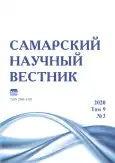Лингводидактический потенциал концептов в обучении иностранным языкам будущих переводчиков
- Авторы: Василенко С.С.1
-
Учреждения:
- Вологодский государственный университет
- Выпуск: Том 9, № 3 (2020)
- Страницы: 258-262
- Раздел: Педагогические науки
- URL: https://journal-vniispk.ru/2309-4370/article/view/50652
- DOI: https://doi.org/10.17816/snv202093303
- ID: 50652
Цитировать
Полный текст
Аннотация
В статье рассматриваются возможности и пути изучения концептов в обучении иностранным языкам будущих переводчиков. Автор отмечает междисциплинарный характер современных дидактических исследований, анализирует теорию концепта с точки зрения лингвистики, культурологии, психолингвистики, а также отмечает факт становления лингвоконцептодидактики как нового научного направления. В статье представлено лингводидактическое понимание концепта, проанализирована его структура и смысловое наполнение. Автор детально описывает процесс овладения иноязычными концептами и представляет его как последовательность нескольких этапов. Освоение иноязычных концептов связано с формированием концептной компетенции. В статье отмечается, что овладение иноязычными концептами должно идти параллельно с освоением иноязычной лексики. Кроме того, необходимо использовать аутентичные материалы в обучении иностранным языкам, которые позволяют формировать концептуальную картину мира носителей языка. Знакомство с иноязычными концептами является особенно актуальным для будущих переводчиков, изучающих несколько иностранных языков и сталкивающихся с проблемой перевода понятий и явлений иноязычной действительности. В статье представлено, каким образом можно реализовать концептуальность в обучении иностранным языкам. Автор приводит практический пример изучения английского концепта «Travel», предлагает примеры упражнений и заданий для его освоения, а также мнемотехнические приемы для запоминания лексем-репрезентантов концепта. Подчеркивается, что концепты необходимо включать в содержание обучения иностранному языку будущих переводчиков. Это способствует формированию правильных представлений об иноязычной действительности, осмыслению фактов родной и иноязычной культуры, т.е. формированию культурной рефлексии.
Ключевые слова
Полный текст
Открыть статью на сайте журналаОб авторах
Светлана Сергеевна Василенко
Вологодский государственный университет
Автор, ответственный за переписку.
Email: svetavasilenko@inbox.ru
кандидат педагогических наук, доцент кафедры лингвистики и межкультурной коммуникации
Россия, ВологдаСписок литературы
- Тарнаева Л.П. Теория концепта в свете лингводидактических проблем // Филологические науки. Вопросы теории и практики. 2014. № 7 (37): в 2-х ч. Ч. I. С. 208–212.
- Кубрякова Е.С., Демьянков В.З., Панкрац Ю.Г., Лузина Л.Г. Краткий словарь когнитивных терминов / под общ. ред. Е.С. Кубряковой. М.: Изд-во МГУ, 1996. 245 с.
- Ляпин С.Х. Концептология: к становлению подхода // Концепты. Научные труды Центроконцепта. 1997. Вып. № 1. С. 11–35.
- Степанов Ю.С. Концепты. Тонкая пленка цивилизации. М.: Языки славянской культуры, 2007. 248 с.
- Залевская А.А. Психолингвистический подход к проблеме концепта // Методологические проблемы когнитивной лингвистики / под ред. И.А. Стернина. Воронеж: Изд-во ВГУ, 2001. С. 36–44.
- Чернышев С.В. Лингвоконцептодидактика как перспективное направление современных лингводидактических исследований // Вестник Воронежского государственного университета. Серия: Лингвистика и межкультурная коммуникация. 2016. № 2. С. 130–135.
- Василенко С.С. Концептная компетенция как цель обучения иностранному языку студентов лингвистических направлений // Педагогическое образование в России. 2013. № 5. С. 151–155.
- Корниенко Е.Р. Понимание иноязычного текста: лингводидактический аспект // Вестник Московского городского педагогического университета. Серия: Филология, Теория языка, Языковое образование. 2010. № 2 (6). С. 91–98.
- Карасик В.И. Языковой круг: личность, концепты, дискурс. Волгоград: Перемена, 2002. 477 с.
- Попова З.Д., Стернин И.А. Когнитивная лингвистика. М.: АСТ Восток-Запад, 2007. 314 с.
- Курганова Н.И. Конструирование концептов в процессе освоения иноязычной культуры // Известия Российского гос. педагогического ун-та им. А.И. Герцена. Психолого-педагогические науки (психология, педагогика, теория и методика обучения). 2008. № 11 (68). С. 132–140.
- Cambridge Dictionary Online [Internet] // https://dictionary.cambridge.org.
- Collins Cobuild Essential English Dictionary / ed. by D. Crystal. Cambridge: Cambridge University Press. 2003. 499 p.
- Longman Activator. The world’s First Production Dictionary, 1995. 1250 p.
- The New Oxford Dictionary of English, 1999. 1516 p.
- Kiss G., Armstrong C., Milroy R. The Associative Thesaurus of English. Edinburgh, 1972. 294 p.
- Василенко С.С. К вопросу об определении единицы обучения иноязычной лексике // Федеральный научно-практический журнал // Вестник Орловского государственного университета. Серия «Новые гуманитарные исследования»: федеральный научно-практический журнал. 2012. № 4 (24). С. 244–246.
- British National Corpus [Internet] // https://thesaurus.com.
- Michigan Corpus of Academic Spoken English [Internet] // https://quod.lib.umich.edu/m/micase.
Дополнительные файлы







